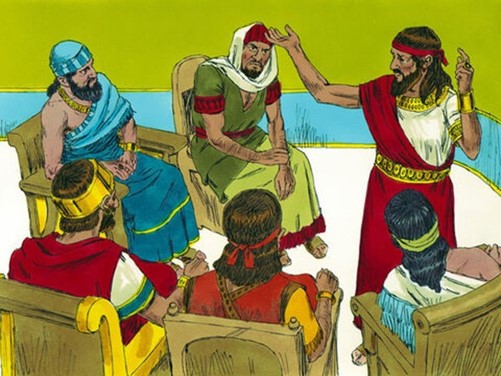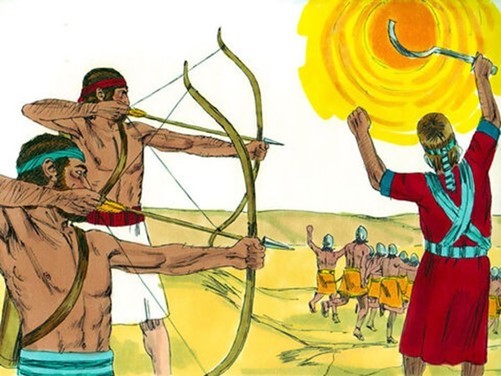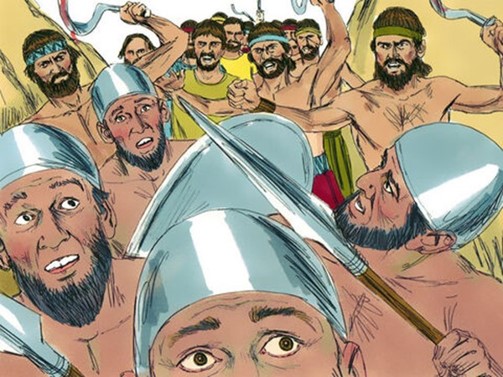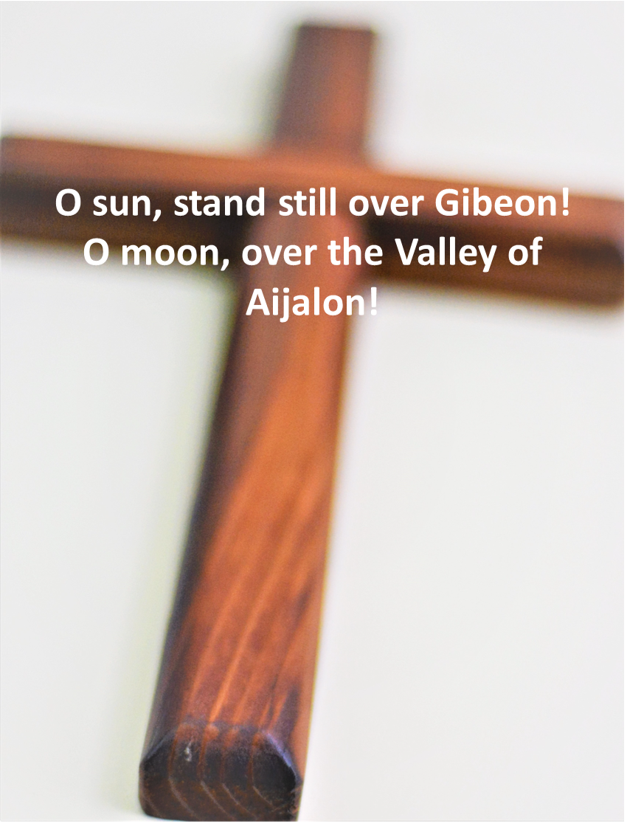Good morning!
Greetings in the name of the Father, the son, and the Holy Spirit.
On the day the Lord gave the Amorites over to Israel, Joshua said to the Lord in the presence of Israel:
“Sun, stand still over Gibeon,
and you, moon, over the Valley of Aijalon.” (Joshua 10:12)

Imagine a scene set thousands of years ago, on the rugged, sun-baked plains of Gibeon. Picture ancient warriors clad in bronze armor, their faces set with determination and anxiety as the tension of an impending battle hangs thick in the air. Here, in this dramatic setting, unfolds a critical moment in history—a moment that would eternally showcase the extraordinary power of faith and divine intervention. This historic episode, deeply embedded in the heart of the book of Joshua, chapter 10, narrates an epic tale where the very laws of nature are suspended by the audacity of a single command.
In this narrative, Joshua, the valiant leader of the Israelites, stands at the precipice of a seemingly impossible challenge against the five kings of the Amorites. Surrounded by five kings and facing overwhelming odds, he does something unprecedented. As the sun begins to dip towards the horizon, signaling the end of day and the potential cessation of their advantage, Joshua turns not to his generals, but to the heavens above. With the battle raging around him, he commands the sun to halt its course across the sky. This is not merely a desperate act of a beleaguered commander but a profound demonstration of faith, showing an unshakeable belief in the power and presence of the Divine amidst the clashing of swords and the cries of war.
This story is more than an ancient account; it is a vivid reminder of the potential of faith to alter the very fabric of reality, inviting us to believe in the possibility of the miraculous in our own lives.

The Power of Bold Prayer
As the Israelites engaged the five Amorite kings in a fierce battle that stretched across the landscape of Canaan, their leader, Joshua, faced a moment of dire urgency. The battle was intense, and as the day drew toward evening, the threat of darkness loomed—a darkness that would shield the enemy’s retreat and deny Israel a complete victory. In this critical moment, with chaos all around and the sun beginning to set behind the hills of Gibeon, Joshua did something unprecedented.
Looking toward the heavens, Joshua issued a command that defied the natural order: “Sun, stand still at Gibeon, and moon, in the Valley of Aijalon” (Joshua 10:12). This command was not borne out of desperation, but from a place of profound conviction and faith. It was a bold declaration of his belief in the God who had promised to be with His people and deliver them. Joshua’s call for the sun and moon to halt was a pivotal moment of faith, demonstrating his deep trust in God’s sovereign power over all creation.
The audacity of Joshua’s prayer teaches us much about the nature of true faith. Faith, as demonstrated by Joshua, is not passive or quietly resigned; it is vigorous and proactive. It compels us to step beyond the conventional boundaries of our understanding and embrace the supernatural possibilities of God’s kingdom. Joshua’s request reflects a dynamic faith that engages directly with God’s promises, holding God to His word while expecting Him to intervene dramatically and decisively.
This kind of faith acknowledges that God is not only able to assist us but is willing to do so in extraordinary ways when we align our requests with His will and purposes. Joshua’s command for the sun to stand still wasn’t merely about winning a battle—it was about securing a promise, about enacting the divine will on earth. It was a testament to his belief that God’s sovereignty extends even over the celestial bodies, a belief rooted in the understanding that nothing is too difficult for God.
The scripture reinforces this view of God’s omnipotence in Jeremiah 32:17, where it is declared, “Ah, Sovereign LORD, you have made the heavens and the earth by your great power and outstretched arm. Nothing is too hard for you.” Joshua’s faith was built on this foundational truth, which empowered him to ask for a miracle that would ensure the fulfillment of God’s promises to Israel.
Moreover, Joshua’s prayer and its resultant miracle serve as profound lessons for us: that God honors the faith that honors Him. The response to Joshua’s faith was immediate and miraculous: “So the sun stood still, and the moon stopped, till the nation avenged itself on its enemies, as it is written in the Book of Jashar. The sun stopped in the middle of the sky and delayed going down about a full day” (Joshua 10:13). This supernatural prolonging of the day was God’s direct response to the bold faith of a man who dared to take God at His word.
This narrative invites us to explore the dimensions of our own faith. Are we prepared to trust God with the impossible in our lives? Joshua’s example challenges us to consider whether our faith leads us to pray bold prayers that expect big things from a big God. It encourages us to cultivate a faith that actively seeks God’s intervention, trusts in His supreme power, and steps out beyond the limits of human reasoning to embrace the full extent of divine possibility.

God’s Response to Faith
The response to Joshua’s audacious prayer, as recounted in the ancient texts, was nothing short of miraculous. Scripture vividly details the event: “The sun stopped in the middle of the sky and delayed going down about a full day” (Joshua 10:13). This extraordinary intervention by God is one of the most striking examples of divine power directly influencing earthly affairs in response to human faith and obedience.
This moment when the sun stood still is not merely a demonstration of God’s ability to control the universe but a profound testament to His dynamic relationship with His people. It illustrates vividly that God is not a distant observer of human struggles but is deeply involved and responsive to the cries of those who call upon Him in sincerity and truth. This intervention shows that God’s engagement with humanity is rooted in a covenant relationship—He responds powerfully and protectively to uphold His promises.
Moreover, this miraculous event underscores a fundamental truth about the nature of God and His interactions with us: when we move in obedience to His commands, He moves in ways that are utterly beyond human comprehension. Joshua’s faith in action and the resulting divine response teach us to anticipate the extraordinary in our lives. It tells us that with God, no situation is too dire, no odds are too overwhelming, and indeed, no time of day is set in stone. God’s capability to intervene transcends all natural laws and human limitations.
This story from Joshua 10 is not just an ancient record; it serves as a vivid encouragement for us today. It urges us to approach our own challenges with the same bold faith as Joshua. When faced with seemingly insurmountable obstacles, we are reminded that we worship a God who listens intently and responds mightily. The passage reassures us that our trials are never ignored and that God is ever-ready to transform our most daunting trials into powerful testimonies of His faithfulness.
Such divine intervention also invites us to trust more deeply in God’s sovereign control over all aspects of creation. The Lord who commanded the sun to pause its journey across the sky is the same God who orchestrates the details of our lives with precise timing and profound purpose. As stated in Psalm 46:1, “God is our refuge and strength, an ever-present help in trouble.” This reassurance is not just for times of global upheaval or personal crisis but also for everyday moments when we need reminders of His presence and power.
The account also deepens our understanding of prayer and its potential to yield miraculous results. It challenges us to examine the depth of our faith: Are we willing to pray as Joshua did? Do we believe God can do the impossible in response to our prayers? The story compels us to expand our expectations of what God can do, encouraging us to believe that He is capable of altering the very course of nature to aid His children.
In conclusion, the day the sun stood still serves as a timeless reminder of God’s unlimited power and His readiness to use it on behalf of those who are committed to His purposes. It encourages us not only to expect responses from God that confound human reasoning but also to live lives marked by the kind of obedience and faith that invites divine intervention. This narrative invites each of us to step into a life where the extraordinary becomes possible, where our faith can indeed move heavens, and where our God proves repeatedly that nothing is beyond His reach or control.

Victory Through Divine Partnership
The extraordinary event of the sun standing still, as described in the book of Joshua, was far more than a mere display of divine might; it served a critical and strategic purpose in the unfolding narrative of Israel’s conquests. This miraculous extension of daylight was not just a spectacular intervention; it was a divine provision that allowed the Israelites the necessary time to secure a complete victory over their adversaries. “So the sun stood still, and the moon stopped, till the nation avenged itself on its enemies” (Joshua 10:13). This passage underscores that God’s interventions are always purposeful, intricately woven into His broader plans for justice, deliverance, and the triumph of His people.
This aspect of the story teaches us about the profound partnership that exists between God and His followers. In our journey through life, we encounter various battles—physical, emotional, or spiritual. The narrative of Joshua and the halted sun reminds us that our efforts, when aligned with God’s will, are not merely our own. Instead, they are supernaturally enhanced and directed towards achieving outcomes that surpass our natural capabilities. This divine enablement transforms what might seem ordinary or even insufficient efforts into extraordinary achievements, emphasizing that with God, all things are possible.
Jesus looked at them and said, “With man this is impossible, but with God all things are possible. (Matthew 19:26).
The partnership highlighted in this biblical account is one of active engagement with God. It suggests that when we face our battles, our role is not passive. We are called to act, to fight, and to strive, but we do so under the guidance and empowerment of God. This relationship is further elucidated in the New Testament, where Paul speaks to the Philippians about working out their salvation “with fear and trembling,” because it is God who works in them “to will and to act in order to fulfill his good purpose” (Philippians 2:12-13). This reinforces the idea that our actions and God’s power are not separate but are synergistically combined to fulfill His divine purposes.
Moreover, this divine partnership is not just about achieving victory over external enemies as it was for Joshua and the Israelites; it also pertains to our internal struggles and spiritual growth. Each challenge we face can be viewed as an opportunity for God to manifest His power in and through us, provided we remain obedient and faithful to His directives. The story of Joshua encourages us to trust in God’s timing and His omnipotent control over all circumstances. It reassures us that when God commands us to move forward, He has already set in place the provisions for our success.
In practical terms, this means that as followers of Christ, we are invited to participate actively in God’s redemptive work in the world. Whether it is through sharing the gospel, serving the needy, advocating for justice, or overcoming personal sin, our efforts are amplified by divine power. This not only increases our potential impact but also deepens our reliance on and intimacy with God. It is a reciprocal relationship where our faith in action invites more of His power into our lives, which in turn fuels our faith.
In conclusion, the story of the extended day not only serves as a testament to God’s willingness and ability to intervene miraculously on behalf of His people but also as a model for our participation in His divine plans. As we align our efforts with God’s will, we can expect not only to witness but also to be partakers in His mighty acts, achieving victories that bear testimony to His glory and sovereignty. This partnership with God is one of the most dynamic elements of the Christian faith, offering each believer the assurance that their labors in the Lord are not in vain but are empowered by the Almighty.
Summary: The Sun Stands Still Today
The story of the sun standing still is a profound testament to God’s active presence and power, demonstrating His willingness to intervene in extraordinary ways for those who exhibit bold faith and obedience. This historical episode from the life of Joshua is not merely an ancient tale but a vibrant lesson that the same God who altered the natural order for His purposes continues to work in the world today. It beckons us to adopt a stance of audacious faith, urging us to pray boldly and expectantly, confident that God’s power can manifest in our own lives, just as it did on the battlefield of Gibeon.
This narrative compels us to consider the depth of our own faith. Are we willing to trust God with the seemingly impossible? Are we prepared to ask for divine intervention in our most challenging situations? The story encourages us not only to believe in the possibility of miracles but to actively seek them through prayer that expresses total reliance on God’s omnipotence. It teaches us that when we align our desires with God’s will and walk in obedience to His commands, we open the door to experiencing His power in ways that can significantly alter the course of our lives.
Moreover, this miraculous event highlights the concept of divine partnership. It reminds us that victories in life—whether they be personal, professional, or spiritual—are not achieved by human effort alone but through cooperation with the divine. This partnership is rooted in continuous communication with God, a commitment to follow His guidance, and a readiness to act upon His instructions, even when they defy conventional understanding or expectations.
As we reflect on Joshua’s bold request and the remarkable response it elicited, let us be inspired to deepen our relationship with God. Trusting in His power to intervene even in the most daunting circumstances, we should feel encouraged to embrace a life marked by spiritual boldness. This story assures us that God is not only capable of dramatic interventions but is also eager to work powerfully in the lives of those who depend on Him.
In sum, the story of the sun standing still serves as a dynamic invitation to live a life transformed by faith and fortified by divine presence. It urges us to view our challenges through the lens of God’s unlimited power, to seek His intervention with confidence, and to celebrate the victories that come from this celestial partnership. As we move forward, let this narrative continually remind us of the immense possibilities that await when we dare to trust and obey the God who commands even the sun.
Let’s pray together. Heavenly Father, we stand in awe of Your mighty power, just as Joshua did on the day the sun stood still. Teach us to pray with boldness, to walk in obedience to Your will, and to trust in Your sovereign power over all creation. May we always remember that You are with us in every battle, ready to extend the day if necessary, to grant us victory in Your name. Help us to embrace Your promises and to live out our faith with courage and conviction.
In Your mighty name, we pray, Amen.

And there has been no day like that, before it or after it, when the Lord heeded the voice of a man, for the Lord fought for Israel. (Joshua 10:14)
